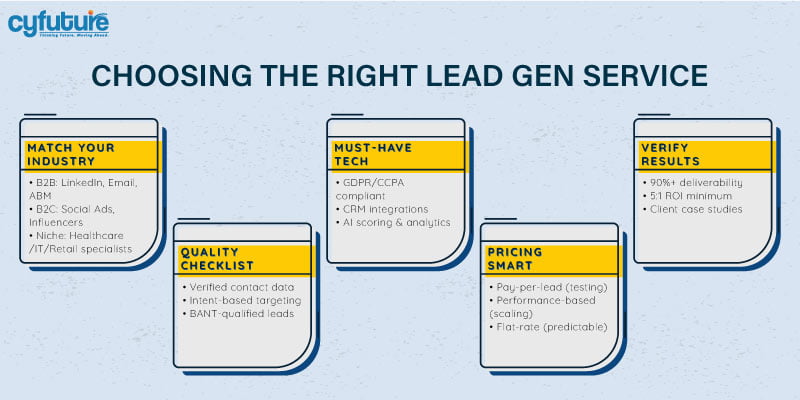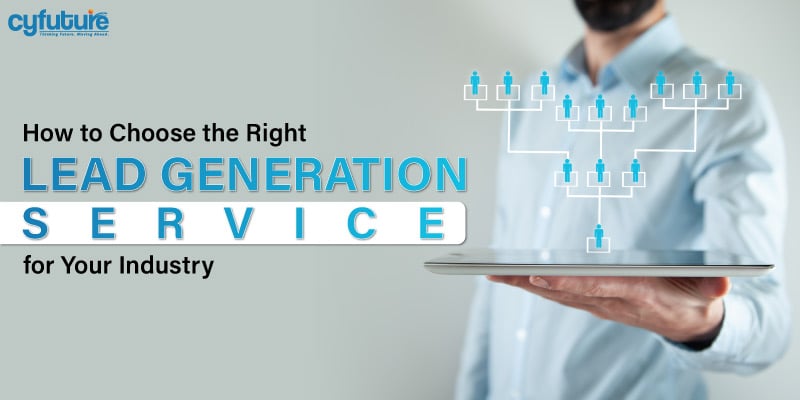 1413 Views
1413 Views
Introduction
In today’s competitive business landscape, generating high-quality leads is crucial for growth. However, not all businesses have the resources or expertise to handle lead generation in-house. This is where lead generation services come into play. These specialized business process services help companies identify, attract, and convert potential customers efficiently.
But with so many providers available, how do you choose the right lead generation service for your industry? This guide will walk you through the key factors to consider, ensuring you make an informed decision that drives results.
1. Understanding Lead Generation Services
Before selecting a service, it’s essential to understand what lead generation services entail. These services help businesses:
- Identify potential customers through targeted marketing strategies.
- Nurture leads until they are sales-ready.
- Qualify leads to ensure they match your ideal customer profile.
- Increase conversion rates by delivering high-intent prospects.
Many business process services providers offer lead generation as part of a broader outsourcing strategy, helping companies streamline operations while boosting revenue.
2. Why Your Industry Matters
Not all lead generation strategies work for every industry. A B2B software company, for example, requires a different approach than a real estate agency. Here’s how industry-specific factors influence your choice:
A. B2B vs. B2C Lead Generation
- B2B lead generation focuses on longer sales cycles, LinkedIn outreach, and email marketing.
- B2C lead generation relies on social media ads, influencer marketing, and quick conversions.
B. Industry-Specific Lead Sources
- Healthcare: Telemarketing, physician referrals, and medical directories.
- Real Estate: Property listings, PPC ads, and CRM-based follow-ups.
- E-commerce: Facebook ads, Google Shopping, and retargeting campaigns.
Choosing a lead generation service that understands your industry’s nuances ensures better targeting and higher ROI.
3. Key Factors to Consider When Choosing a Lead Generation Service

A. Industry-Specific Experience Matters
The most effective lead generation providers deeply understand your sector’s unique dynamics. Look for vendors with documented success in your industry through case studies and client testimonials. Their familiarity with your target audience’s pain points, buying cycles, and decision-making processes enables them to craft campaigns that resonate better than generic approaches. For instance, a provider experienced in healthcare lead gen will know HIPAA compliance requirements and physician referral networks, while a B2B tech specialist understands how to navigate complex enterprise sales cycles.
B. Quality Trumps Quantity in Lead Generation
Sophisticated buyers recognize that lead volume alone means little without conversion potential. Top-tier services implement rigorous qualification frameworks like BANT (Budget, Authority, Need, Timeline) or CHAMP (Challenges, Authority, Money, Prioritization) to ensure delivered leads are sales-ready. They’ll focus on intent signals – whether a prospect downloaded your pricing sheet, attended a webinar, or visited key product pages – rather than simply providing contact lists. This qualification process dramatically improves your sales team’s efficiency and close rates.
C. Compliance and Data Integrity Are Non-Negotiable
In today’s regulatory environment, working with providers who prioritize data ethics protects your brand reputation and avoids costly penalties. Reputable services use compliant data collection methods (like first-party intent data or opted-in contacts) rather than purchased/scraped lists. They should readily explain their data verification processes, refresh cycles, and adherence to regulations like GDPR, CCPA, and industry-specific rules (e.g., TCPA for telemarketing or HIPAA for healthcare). Ask for their data source documentation and compliance certifications before engaging.
D. Technology Stack Drives Results
Leading providers differentiate themselves through their tech infrastructure. Look for:
- AI-powered lead scoring that predicts conversion likelihood
- Seamless CRM integrations (Salesforce, HubSpot, etc.) for smooth lead handoff
- Marketing automation for efficient nurturing at scale
-
Predictive analytics to optimize campaign targeting
These tools enable providers to deliver more precise targeting, faster lead response times, and better campaign ROI than manual approaches.
E. Pricing Alignment With Business Objectives
Different pricing models suit various business needs:
- Pay-per-lead works well for testing or startups needing predictable acquisition costs
- Monthly retainers suit established businesses wanting dedicated resources
- Performance-based pricing (pay-per-appointment or revenue share) aligns incentives but typically costs more
The optimal model depends on your sales cycle length, average deal size, and risk tolerance. Many providers offer hybrid models for flexibility.
F. Adaptability for Long-Term Success
Your ideal provider should grow with your business, offering:
- Campaign customization to test different messaging/offers
- Channel diversification (adding new platforms as needed)
- Volume flexibility to scale up for launches or down during slow periods
-
Strategic consulting to refine approaches based on performance data
This ensures your lead generation evolves with market changes and business growth.
G. Transparency Through Analytics
Comprehensive reporting should go beyond basic lead counts to include:
- Lead-to-customer conversion rates
- Cost per qualified lead and customer acquisition cost
- Channel-specific performance metrics
-
Lead engagement scoring and behavior tracking
Real-time dashboards and regular performance reviews enable data-driven optimization of your lead generation investment.
4. Types of Lead Generation Services
Different businesses require different approaches. Here are the most common types of lead generation services:
A. Inbound Lead Generation focuses on attracting potential customers through valuable, non-intrusive content. This includes:
- Content marketing (e.g., whitepapers, e-books, and case studies) to educate prospects.
- SEO & blog posts to drive organic traffic from search engines.
- Social media engagement (e.g., LinkedIn discussions, Facebook groups) to build relationships.
B. Outbound Lead Generation involves proactive outreach to prospects, such as:
- Cold calling for direct conversations with potential buyers.
- Email marketing (e.g., personalized drip campaigns) to nurture leads.
- Direct mail campaigns (e.g., postcards, brochures) for targeted offline engagement.
C. Digital Advertising accelerates lead generation through paid channels, including:
- Google Ads (search & display) for intent-based targeting.
- Facebook & LinkedIn ads for demographic and professional audience targeting.
- Retargeting campaigns to re-engage website visitors who didn’t convert.
D. Lead Nurturing & CRM Management ensures leads move smoothly through the sales funnel via:
- Automated email sequences to educate and warm up prospects.
- CRM follow-ups (e.g., Salesforce, HubSpot) to track interactions.
- Chatbot interactions for instant engagement and qualification.
Evaluate which method aligns best with your industry and business goals.
5. Red Flags to Avoid
Not all lead generation services are reliable. Watch out for:
- Guaranteed results with no proof (lead gen is never 100% predictable).
- Poor communication & slow response times.
- Unverified or outdated lead databases.
- Lack of transparency in pricing or reporting.
6. Steps to Evaluate a Lead Generation Provider
1. Define Your Goals
Why it matters: Different businesses need different lead gen strategies. Before selecting a provider, clarify what you want to achieve.
Key questions to ask:
- Are you focused on brand awareness? (e.g., generating interest in a new product)
- Do you need high-ticket sales leads? (e.g., B2B enterprise deals with long sales cycles)
- Is lead nurturing a priority? (e.g., converting warm leads into customers via email sequences)
Example:
- A SaaS startup may need lead nurturing to educate prospects before selling.
- A real estate agency may prioritize high-intent leads ready to buy or sell property.
Action Step:
- Write down your primary and secondary lead gen objectives.
- Ensure the provider specializes in your desired outcome.
2. Research & Shortlist Providers
Why it matters: Not all lead gen services are equal—some excel in specific industries or methods.
Key evaluation criteria:
- Industry expertise (Do they have case studies in your niche?)
- Client reviews & testimonials (Check Google, Clutch, or G2)
- Lead generation methods (Inbound, outbound, digital ads, etc.)
- Reputation & credibility (Avoid providers with shady practices)
Example:
- A healthcare company should look for providers experienced in HIPAA-compliant lead gen.
- A B2B tech firm may prefer a service specializing in LinkedIn and email outreach.
Action Step:
- Create a shortlist of 3-5 providers based on research.
- Eliminate those with poor reviews or irrelevant experience.
3. Request a Demo or Trial
Why it matters: A demo or trial reveals how the provider operates before you commit.
What to look for:
- Lead quality (Are the leads genuinely interested or just random contacts?)
- Communication style (Do they respond quickly and professionally?)
- Technology & tools (Do they use CRM automation, AI, or analytics?)
Example:
- A trial campaign for a small batch of leads can reveal conversion rates.
- A demo call can show how they handle lead qualification.
Action Step:
- Ask for a free trial or a small pilot project.
- Measure initial results before signing a long-term contract.
4. Analyze Their Lead Qualification Process
Why it matters: Unqualified leads waste sales team time and hurt ROI.
Key questions to ask:
- How do they verify leads? (Do they use BANT—Budget, Authority, Need, Timeline?)
- What disqualifies a lead? (Do they filter out irrelevant or low-intent prospects?)
- Do they provide lead scoring? (Ranking leads based on conversion likelihood)
Example:
- A good provider will ensure leads match your ideal customer profile (ICP).
- A bad provider may deliver generic leads with no real buying intent.
Action Step:
- Ask for a sample lead report to see their qualification criteria.
- Ensure they align with your sales funnel requirements.
5. Check Contract Terms
Why it matters: Some providers lock businesses into long, inflexible contracts.
Key considerations:
- Contract length (Avoid multi-year commitments if possible)
- Pricing transparency (Hidden fees? Pay-per-lead vs. retainer?)
- Exit clauses (Can you cancel if results are poor?)
- Service-level agreements (SLAs) (Guaranteed lead volume or quality?)
Example:
- A startup may prefer monthly contracts to test performance.
- An enterprise may negotiate custom SLAs for lead quality assurance.
Action Step:
- Read the fine print before signing.
- Negotiate flexible terms if needed.
Evaluating a lead generation provider requires due diligence. By following these steps—defining goals, researching, testing, verifying lead quality, and reviewing contracts—you can choose a partner that delivers real, high-converting leads for your business.
7. Top Lead Generation Services by Industry
Here are some industry-specific recommendations:
| Industry |
Recommended Lead Generation Service |
| B2B Tech |
ZoomInfo, Cognism, UpLead |
| Healthcare |
PatientPop, Doceree, Cience |
| Real Estate |
Zillow Premier Agent, BoldLeads, Market Leader |
| E-commerce |
Klaviyo, AdRoll, HubSpot |
8. Conclusion
Choosing the right lead generation service is a game-changer for your business. By considering industry relevance, lead quality, compliance, and scalability, you can partner with a provider that drives sustainable growth.
If you’re outsourcing as part of broader business process services, ensure seamless integration between lead gen and other operations like sales and customer support.

Take the time to evaluate providers thoroughly—your future revenue depends on it!
Related Posts in This Category

